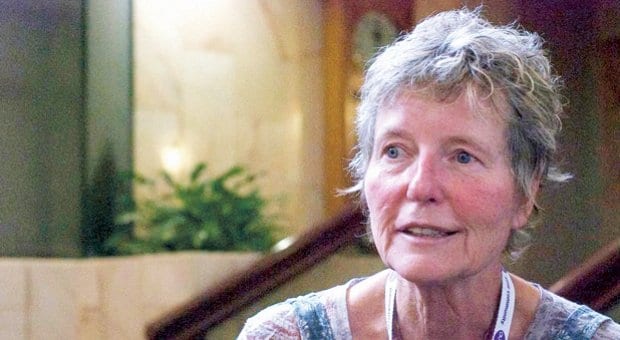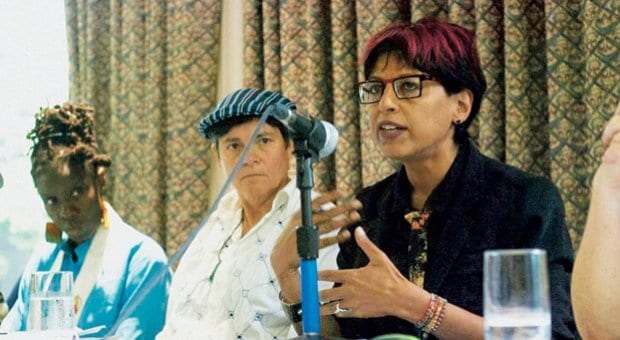
Gabriola Island comedian Sheila Norgate, who performed at BOLDFest, says she comes to the conference for the community and the chance to have frank discussions. Credit: Erin Flegg
For the ninth consecutive year, more than a hundred women from across Canada and the United States converged on Vancouver for BOLDFest (Bold Older Lesbians and Dykes), the annual conference for older queer women. Events are both educational and social, and the lineup this year included workshops on topics from intergenerational dialogue to humour in healing and flirting.
Sheila Norgate, a comedian from Gabriola Island, performed Friday night and attended the workshop on intergenerational dialogue. She said she comes to BOLD for the community and the chance to have frank discussions.
The key focus of Friday’s speakers and workshops seemed to be the words women use to describe themselves.
Norgate, who came out in 1968, when homosexuality was still criminalized, was particularly interested in talking about feminism with those of the younger generation. She’s concerned that fear of being called feminists is keeping young women from moving forward.
“The emphasis now is on humanism, not feminism, but that’s a great way to become invisible,” she said. “We’re not done, but the culture thinks we are.”
Greta Hurst, 77, who recently switched from calling herself a lesbian to calling herself queer, has come to BOLD every year since the festival’s inception.
“The point of who comes, what I hear, and what I’m here for, changes every year,” she says. This year she was keen to hear about younger women’s experiences.
Hurst had her first relationship with a woman at the age of 19 and was disowned by her family. Seeing no future for herself, she decided to marry a man. She came out again much later in life after encountering a group of lesbians from Berlin who attended the International Tribunal on Crimes Against Women in Brussels in 1976. Those women demanded to be seen not just as women, Hurst says, but as lesbians and feminists. “Feminism gave me the courage to be a dyke.”
BOLD co-organizer Claire Robson says she and fellow organizer Pat Hogan are thrilled with how this year’s conference turned out. She says they try to keep things fresh by planning new events every year. This is the first time the conference has hosted an afternoon panel discussion rather than a full day of workshops.
“That’s how you stay young,” Robson says. “Through movement, through change, through unpredictability.”
During lunch at the Coast Plaza Hotel, BOLDFest conferred its Woman of the Year Award on the late poet Meg Torwl. Robson says the award represents perfectly what BOLD is about.
“We need to maintain spaces where the lives and issues of older women are forefront and celebrated.” Robson adds that Torwl’s partner approached her after the ceremony to thank her. “Adrian told me this is the best day in her life since Meg died.”
Afternoon activities included a dance workshop and a panel discussion titled Does God Love Lesbians? The panel was made up of four women of different faiths: Christian minister Kerri Messner; Dr Valerie Mason-John, chairperson of the Vancouver Buddhist Centre; Métis sundancer Bon Fabian; and Fatima Jaffer, a PhD candidate at UBC and a Muslim.
Topics ranged from how different spiritualities approach queerness, to challenging tradition and conceptualizing queer spirituality as radical.
Messner joked that she often has to come out as queer to her Christian friends and come out as Christian to her queer friends.
Mason-John spoke about the labels people use to define themselves and how her experience in Buddhism has helped her to loosen some of them.
Charlene Scott, a first-time attendee from Philadelphia who has been practising Buddhism for 33 years, said she sees labels as nothing more than extra words.
“I’m black; that’s an adjective. You’re white; that’s an adjective. Lesbian is just an adjective.”
Scott believes those labels, even the ones individuals choose for themselves, are a source of pain.

 Why you can trust Xtra
Why you can trust Xtra


